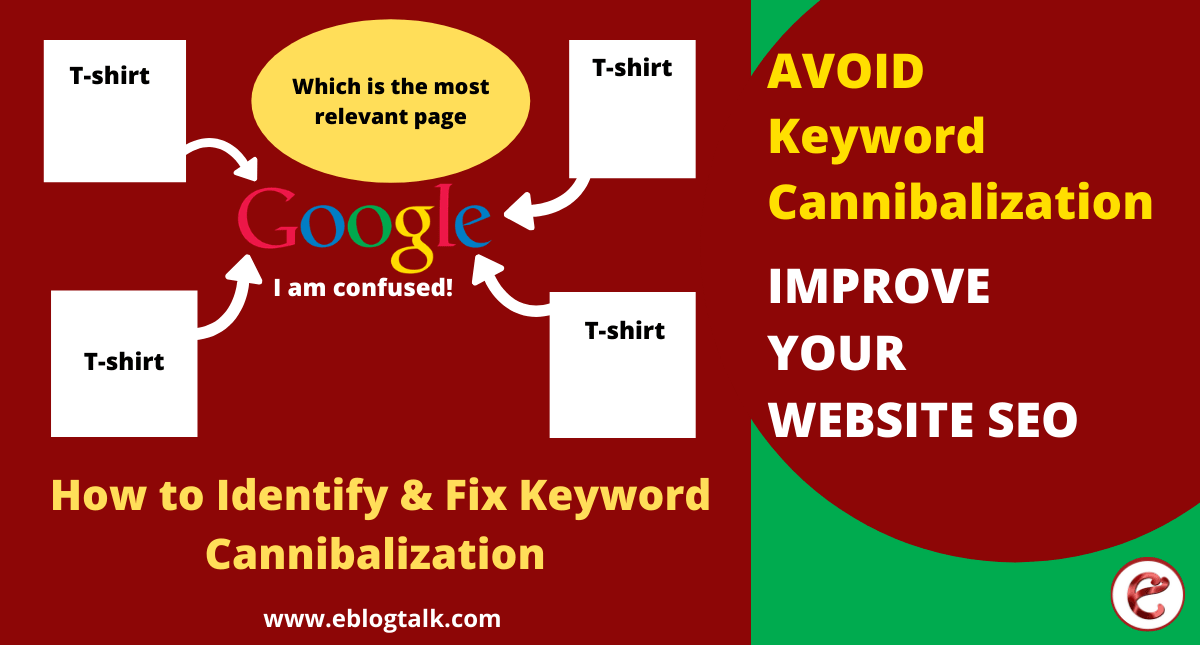Keyword Cannibalization: There is a keyword misconception that the more pages you have targeting a keyword for the better search engine results.
After all, as much as you will give your afford to your niche, in the same ratio you will get in return. And the more likely Google picks up the website page on that particular keyword and upgrades your SERPs ranking, right?
Actually, no. That isn’t true.
In fact, targeting a particular keyword across multiple pages always has the just opposite effect. Unknowingly, you are doing more harm than good to your SEO.
Simple reason for the above one: When you have multiple pages ranking for the same keywords, you are actually a competitor with yourself.
Consequently, each page has a lower CTR, lower conversion rates, and diminished authority than one consolidated page will have.
We call this SEO misconception Keyword cannibalization.
What is Keyword Cannibalization?
Cannibalizing your own search results for a specific keyword is called Keyword cannibalization. It’s splitting CTR, links, content between multiple pages that should be one.
By doing this cannibalization, you are not improving the authority of your website for that keyword. Instead you are asking Google to weigh your multiple pages against each other and choose the best one among them.
For example, if you have an e-commerce website and you are selling T-shirts of different brands such as. But you are targeting a specific keyword i.e. t-shirts, and telling Google that every page is about “shoes” regardless of also targeting different brands or fabric.
6 Negative Effects of Keyword Cannibalization on your SEO:
Keyword cannibalization has terrible consequences for SEO. Even many people don’t know about this term Keyword cannibalization. Due to this they don’t know what’s going wrong in their websites.
Even they are happy that one page is ranking on the first page for their target keywords.
The practical consequences are:
- Lost website traffic
- Queries leading to the wrong page
- Fluctuating SERP rankings
Because:
1. You are diminishing the Authority of your page.
Instead of having one highly authoritative page, you are splitting your CTR to multiple pages. Actually you have turned your own multiple pages into competitors and now fighting for page views and SERP ranks.
You are diluting your links and Anchor text
Backlinks that should have gone to one consolidated information in one page are now split between multiple pages.
Similarly, your anchor text and internal links are leading visitors to multiple different pages instead one authoritative page on a specific keyword.
3. Google may devalue the relevant page
Keywords are one of the ways in which we help Google understand what our pages are all about. If keywords are the same for different websites, it confuses Google to understand which one is best among different pages.
4. You are squandering your crawl budget
The crawl budget is the number of times a search spider crawls the website in a given interval of time.
Multiple pages having the same target keyword results in a crawling and indexing of pages that are not needed.
5. Keyword cannibalization is a sign of poor page quality
Targeting target keywords in multiple pages tells the users that the content is poor in quality, and it also signals Google that your content may not match the keywords on each page.
6. Conversion rate will go down
One single authorized page i.e. consolidated information on that specific keyword converts better than the rest.
Instead of directing new visitors to that page, and making it the most authoritative page, you are losing potential users when they land on less relevant pages.
How do we improve page speed- The Complete Guide
How to Identify Keyword Cannibalization problem
Fortunately, once you identify the Keyword Cannibalization problem, fixing it is vet easy.
Simply, you only need to create a spreadsheet that lists all of your site’s important URLs and their associate keywords.
Alternatively, you can also use keyword mapping tool
When you have listed out your URLs and their keywords, run down the list and look for the duplicate entries.
If you find any- then you are suffering from keyword cannibalization.
Even sometimes meta information in your title tags seems to target the same keywords, so double-check the meta too.
Now it’s time to fix those pages!
8 Types of Anchor text
How to fix keyword cannibalization
Solving keyword cannibalization depends on the root of the problem. Here are possible solutions for the keyword cannibalization.
1. Website’s restructure
The simplest solution is to turn the authoritative page into the landing page that links to other unique variations that come under the target keywords.
For example: T-shirt is the canonical url and links all of the more specific variations back to it.
2. Create new landing page:
There might be a lack of a landing page that consolidates all of your pages in one place. In this case, create a unique landing page as a source page and link all the variations from there.
3. Consolidate the content
If your pages are not unique to warrant having multiple pages targeting the same keywords, consider combining them into one page.
In this case, you can turn the underperforming pages into a more authoritative source. It may also solve the thin content issues.
4. Find New Keywords:
Sometimes you have content rich pages, and the only thing you are suffering from is a poorly planned keyword strategy. In this case you only need to find new keywords. Be sure that the new keywords accurately describe your page’s content.
5. 301 Permanent Redirect
eBLOGTALK suggests against using too many 301s. Permanent redirection might be necessary if you already have multiple pages ranking for the same keyword.
These redirections consolidate the cannibalized content by linking the less relevant pages to a single, more authoritative version.
Note:
This tactic is beneficial only for the pages with similar content and those matching specific keyword queries.
These five solutions will fix most of the problems of keyword cannibalization. But if you manage the e-commerce website, you should be particularly careful to note how the CMS separates products with variable sizes and colors. Some CMS create separate pages for every product variation.
If your CMS is creating products like this, you should do:
- Restrict duplicate pages from being indexed using robots.txt
- tags
- Use canonical URLs to consolidate links for the duplicate content.
Conclusion
Keyword cannibalization is more important than ever before. If your website is cannibalizing its own target keywords, the solutions are nearby you and the damage is not permanent. With the right tool, you can give your website a boost.
If you liked this article, then please subscribe to our YouTube Channel for WordPress video tutorials. You can also find us on Twitter and Facebook. Share eblogtalk informational articles with your friends and on social media. Thank you.








